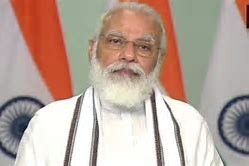PM Modi said while addressing the conclave on ‘Transformational Reforms in Higher Education under NEP’ that the education policy was approved after extensive discussions for more than three to four years and taking over lakhs of suggestions into consideration.
Prime Minister Narendra Modi said on Friday he is “fully committed” to the National Education Policy (NEP), which was launched last month, as he assured it will be implemented fully.
PM Modi said while addressing the conclave on ‘Transformational Reforms in Higher Education under NEP’ that the education policy was approved after extensive discussions for more than three to four years and taking over lakhs of suggestions into consideration.
“It is natural for some people to question that after such a big reform was brought on paper, how will it be implemented at the ground level. That is, now everyone’s eyes are towards its implementation,” PM Modi said.
“All of you are directly involved with the implementation of the National Education Policy and therefore your role is very important. As far as political will is concerned, I am fully committed to it and I am with all of you,” he added.
The Prime Minister said the NEP 2020 is being widely discussed across the country and that people from different fields and different ideologies are giving their views and reviewing the policy.
“This is a healthy debate. The more it is, the more benefit the country’s education system will get,” he said.
“It is also a matter of happiness that after the National Education Policy was launched, no one raised any doubt whether it is biased or is leaning towards one side,” he added.
The conclave is being organised by the ministry of education and the University Grants Commission (UGC) through video-conferencing. Union human resource development minister Ramesh Pokhriyal and Union minister of state for communications Sanjay Dhotre were also present at the event.
A number of dignitaries, including the chairperson and members of the committee for draft NEP, as well as eminent academicians and scientists also attended the conclave.
The Prime Minister has said the Centre’s New Education Policy stressed on building job creators instead of job seekers and emphasised that the time had come for increased focus on learning, research and innovation in the field of education.
“The 21st century is an era of knowledge. This is the time for increased focus on learning, research, innovation. This is exactly what India’s National Education Policy, 2020 does. We are focussing on the quality of education in the country. Our attempts have been to make our education system the most advanced and modern for students,” PM Modi told students at a virtual interaction last Saturday.
The Union cabinet had passed India’s first new National Education Policy last month in at least 28 years, recommending primary education in local languages, facilitating the possible entry of foreign universities in India, creating a single higher-education regulator, and easier board examinations in wide-ranging reforms aimed at making the Indian education system more contemporary and skill-oriented.
The policy also sets ambitious targets: increasing the Gross Enrolment Ratio (GER) to 50% from the current 26%, creating an additional 35 million seats in colleges, and increasing the education budget to 6% of the GDP from the present 4%. The NEP lays down that by 2040, all higher education institutions (HEIs) shall aim to become multidisciplinary. It also says that by 2030 there will be at least one large multidisciplinary institution in or near every district. It also moots Special Education Zones (SEZ) in backward districts.
The policy, drafted by a committee headed by former Isro chief K Kasturirangan submitted its report last year.








Comments (0)